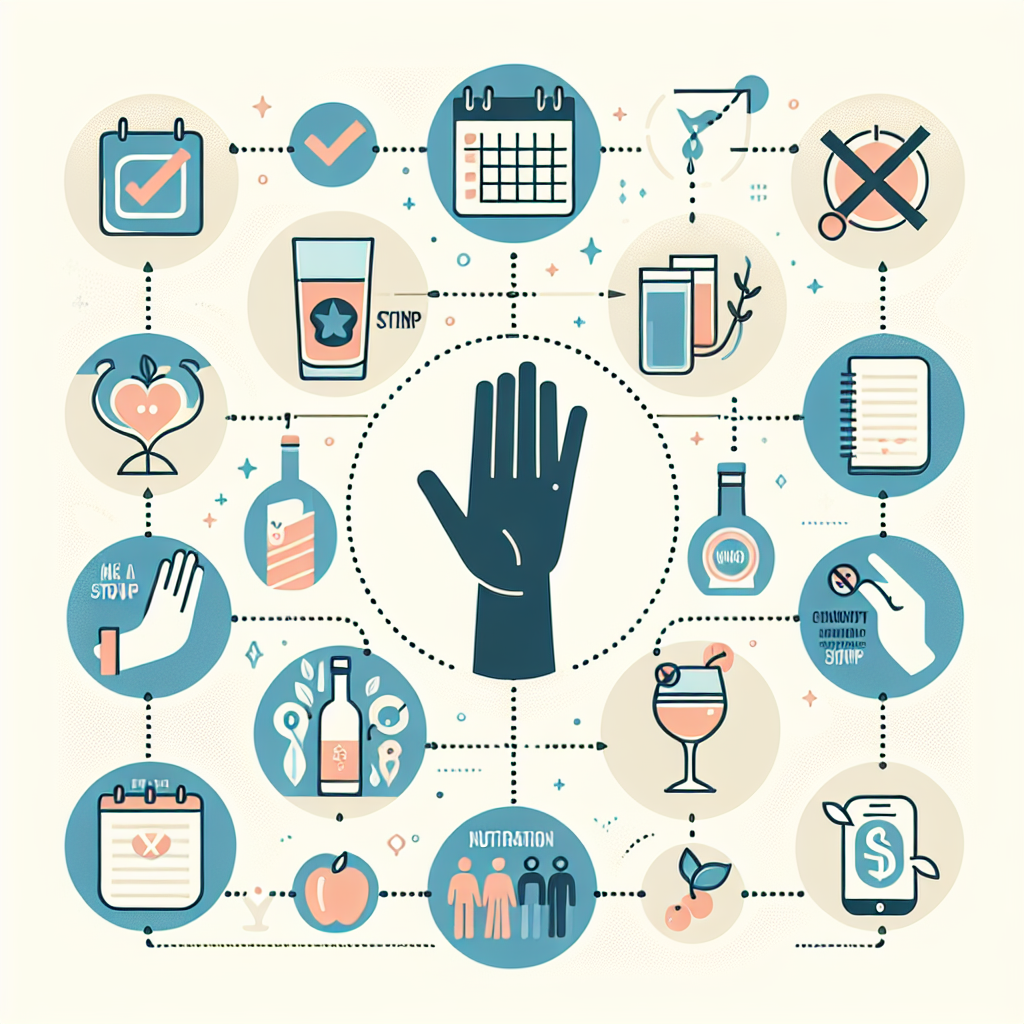-
Table of Contents

“Empower Yourself: Practical Steps to Quit Drinking Independently”
Introduction
Quitting alcohol on your own can be a challenging yet rewarding journey. Whether you’re looking to cut back for health reasons, personal growth, or to regain control over your life, there are several strategies and tips that can help you succeed. This guide provides practical advice on how to stop drinking on your own, including setting clear goals, finding alternative activities, seeking support, and developing coping mechanisms to handle cravings and triggers. By following these steps, you can take meaningful strides towards a healthier, alcohol-free lifestyle.
Effective Strategies to Quit Drinking: A Comprehensive Guide
Quitting drinking on your own can be a challenging yet incredibly rewarding journey. The decision to stop drinking is a significant first step, and it sets the stage for a healthier, more fulfilling life. To help you navigate this path, we have compiled a series of effective strategies that can guide you through the process. By implementing these tips, you can empower yourself to overcome the urge to drink and embrace a sober lifestyle.
First and foremost, it is essential to set clear and realistic goals. Understanding why you want to quit drinking and what you hope to achieve can provide a strong foundation for your journey. Whether your motivation stems from health concerns, personal relationships, or a desire for self-improvement, having a clear vision can keep you focused and determined. Writing down your goals and revisiting them regularly can serve as a powerful reminder of your commitment.
In addition to setting goals, creating a supportive environment is crucial. Surrounding yourself with people who understand and respect your decision can make a significant difference. This might involve having open conversations with friends and family about your intentions and seeking their encouragement. Moreover, joining support groups, either in-person or online, can provide a sense of community and shared experience. These groups offer a platform to share your struggles and successes, making the journey less isolating.
Another effective strategy is to identify and avoid triggers that lead to drinking. Triggers can be emotional, social, or environmental, and recognizing them is key to preventing relapse. For instance, if stress is a trigger, finding alternative ways to manage it, such as through exercise, meditation, or hobbies, can be beneficial. Similarly, if certain social settings or people encourage drinking, it might be wise to limit your exposure to these situations initially. Over time, you can develop new habits and coping mechanisms that do not involve alcohol.
Furthermore, developing a routine can provide structure and stability. Establishing a daily schedule that includes healthy activities can help fill the void left by drinking. This might involve setting aside time for exercise, pursuing hobbies, or engaging in social activities that do not revolve around alcohol. A well-structured routine can keep you occupied and reduce the temptation to drink.
Equally important is the practice of self-care. Taking care of your physical and mental well-being can enhance your ability to stay sober. This includes maintaining a balanced diet, getting adequate sleep, and engaging in regular physical activity. Additionally, practicing mindfulness and stress-reduction techniques can improve your emotional resilience. Self-care is not just about avoiding alcohol; it is about nurturing yourself in a holistic manner.
Moreover, celebrating your milestones, no matter how small, can boost your motivation. Acknowledging your progress and rewarding yourself for your achievements can reinforce positive behavior. Whether it is a week, a month, or a year of sobriety, each milestone is a testament to your strength and determination. Treat yourself to something special, like a favorite meal, a new book, or a day out, to mark these occasions.
Lastly, it is important to be patient and compassionate with yourself. The journey to sobriety is not always linear, and setbacks may occur. Instead of viewing these as failures, consider them as opportunities to learn and grow. Reflect on what led to the setback and how you can address it moving forward. Remember, every step you take towards quitting drinking is a step towards a healthier, more fulfilling life.
In conclusion, quitting drinking on your own is a challenging but achievable goal. By setting clear goals, creating a supportive environment, identifying triggers, developing a routine, practicing self-care, celebrating milestones, and being patient with yourself, you can successfully navigate this journey. Embrace the process with determination and self-compassion, and you will find yourself on the path to a brighter, sober future.
Self-Help Tips for Overcoming Alcohol Addiction: Practical Advice
Overcoming alcohol addiction is a challenging journey, but it is entirely possible to stop drinking on your own with the right mindset and strategies. The first step in this transformative process is acknowledging that you have a problem and making a firm decision to change. This self-awareness is crucial, as it lays the foundation for all subsequent efforts. Once you have committed to quitting, it is essential to set clear, realistic goals. These goals will serve as a roadmap, guiding you through the ups and downs of your journey.
One effective strategy is to identify your triggers—situations, people, or emotions that prompt you to drink. By recognizing these triggers, you can develop healthier coping mechanisms to deal with them. For instance, if stress is a significant trigger, consider adopting relaxation techniques such as deep breathing exercises, meditation, or yoga. These practices can help you manage stress without resorting to alcohol. Additionally, keeping a journal can be a powerful tool. Writing down your thoughts and feelings can provide insight into your drinking patterns and help you track your progress.
Another crucial aspect of quitting alcohol is building a strong support system. While you are choosing to stop drinking on your own, it does not mean you have to do it entirely alone. Reach out to friends and family members who can offer encouragement and hold you accountable. Sharing your goals with others can provide a sense of responsibility and motivation. Moreover, consider joining support groups, either in person or online. These communities can offer valuable advice, share experiences, and provide a sense of camaraderie.
In addition to emotional support, making lifestyle changes can significantly impact your ability to quit drinking. Start by removing alcohol from your home to reduce temptation. Replace it with healthier alternatives such as herbal teas, sparkling water, or fresh juices. Engaging in regular physical activity can also be beneficial. Exercise releases endorphins, which can improve your mood and reduce cravings. Furthermore, maintaining a balanced diet can help stabilize your blood sugar levels, reducing the urge to drink.
It is also important to develop new hobbies and interests to fill the time you previously spent drinking. Engaging in activities that bring you joy and fulfillment can distract you from cravings and provide a sense of purpose. Whether it is painting, hiking, reading, or learning a new skill, finding something that excites you can make the process of quitting more enjoyable.
As you navigate this journey, it is essential to practice self-compassion. Understand that setbacks are a natural part of the process. If you slip up, do not be too hard on yourself. Instead, view it as a learning opportunity and recommit to your goals. Celebrate your successes, no matter how small they may seem. Each day without alcohol is a victory and a step closer to a healthier, more fulfilling life.
Lastly, consider seeking professional help if you find it difficult to quit on your own. Therapists and counselors specializing in addiction can provide personalized strategies and support. They can help you address underlying issues that may be contributing to your drinking and offer guidance on maintaining long-term sobriety.
In conclusion, stopping drinking on your own is a challenging but achievable goal. By setting clear objectives, identifying triggers, building a support system, making lifestyle changes, and practicing self-compassion, you can overcome alcohol addiction and embark on a path to a healthier, more fulfilling life. Remember, every step you take towards sobriety is a testament to your strength and determination.
Q&A
1. **Question:** What are some strategies to help stop drinking on your own?
**Answer:** Some strategies include setting clear goals, removing alcohol from your home, finding alternative activities to replace drinking, seeking support from friends and family, and keeping a journal to track your progress.
2. **Question:** How can mindfulness and meditation help in stopping drinking?
**Answer:** Mindfulness and meditation can help by reducing stress and anxiety, increasing self-awareness, and providing healthier coping mechanisms to deal with cravings and emotional triggers.
Conclusion
To stop drinking on your own, it’s crucial to set clear goals, identify triggers, and develop coping strategies. Seek support from friends, family, or support groups, and consider professional help if needed. Replace drinking with healthier activities, maintain a balanced lifestyle, and stay committed to your decision. Regularly review your progress and adjust your strategies as necessary to maintain sobriety.



